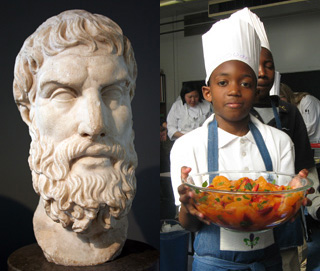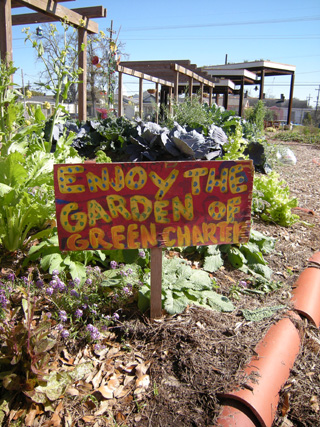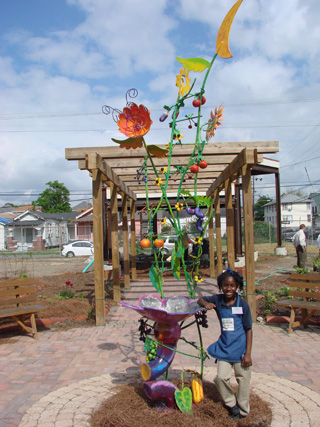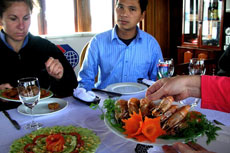Human Flower Project
Learning the Lesson of Happiness: the A(ubergines), B(eets), C(arrots)
A New Orleans charter school takes up ancient Epicurean pedagogy, and a hoe.

Epicurus (300 BC) and student of Samuel J. Green
Charter School (2009 AD)
Photos: Florida Humanist; Edible Schoolyard New Orleans
By Allen Bush
Ancient philosopher Epicurus would have loved what’s going on in the New Orleans Uptown Freret neighborhood. The Samuel J. Green Charter School here has updated several pages from his guide to self- sufficiency and the good life. Whole wheat (not grits!) is served, and fresh vegetables and flowers feed 426 children, body and soul. Kindergartners learn their ABCs from the garden – Aubergines…Beets…Carrots. (I’m making-up “aubergines” but did hear that one school kid had asked another, “You’ve never had eggplant caponata?”)
I like what’s in the air. President Obama has recently been promoting more “laboratories of innovation” in education; First Lady Michelle Obama has announced she will continue serving fresh organic foods in the White House, a direction quietly begun under Laura Bush. And there is rumbling that a vegetable garden might be planted on the First Lawn. I had never imagined a high functioning K-8 garden school, much less a nation of gardeners consumed with fresh foods. Maybe we have the misunderstood Epicurus to thank.
Epicurus advocated foremost the attainment not of wisdom or justice but happiness. Richard Pogue Harrison’s Gardens – An Essay on the Human Condition argues that Epicurianism has been taken for “a crass philosophy of materialism that chases after the pleasure of the day.” Harrison writes, “Nothing could be further from the truth.”
He contends that Epicurianism is an ethic of cultivation, not consumption, and has much to teach us. “Patience, hope, and gratitude? These are existential dispositions that we have all but exiled.”
Epicurus’s disciples kept “an actual kitchen garden” and ate from it, but their gardening was more than culinary. It “was also a form of education in the ways of nature: its cycles of growth and decay, its general equanimity, its balanced interplay of earth, water, air, and sunlight.”
 The garden at Samuel J. Green Charter School
The garden at Samuel J. Green Charter School
Photo: Allen Bush
Post-Katrina reconstruction has required an abundance of patience, hope and gratitude throughout the Gulf Coast.
Samuel J. Green Charter School was one of the first charter schools to emerge in the remarkable re-shuffling of public education in New Orleans; the city now has enrolled over 50% of its students in approximately 40 charter schools. Dr. Tony Recasner, principal of the Green School (2005 -2007) and currently President of Firstline Schools, the non-profit overseeing New Orleans charter schools, told writer Sam Winston: “The challenge is how do you get kids inspired about learning every day? We do it by building positive and nurturing relationships with kids as a way of bringing them in and making every day count, and creating an experience that is academically challenging, meaningful and personally rewarding.”
Restaurateur Alice Waters, owner of Chez Pannise, began her first school gardening program in Berkeley, California, at the Martin Luther King Middle School in 1995. J. Robert Murphy, an associate professor of psychology at Harvard Medical School, later conducted a two year study and determined that these students, “are more enthusiastic about attending school, make better grades, eat healthier food due to wiser food choices, and become more knowledgeable about natural processes.”
By the fall of 2006, New Orleans seemed ripe for the second Edible Schoolyard. Waters, Rescasner and philanthropist Randy Fertel brainstormed and organized. They saw no reason why ABCs couldn’t be pea pickin’ good. “We hope to renew New Orleans one okra plant and one child at a time,” Rescasner said confidently. Gifted teachers engaged children and parents; community groups grew interested; foundations and private donors got involved; and the school’s black loamy soil was eventually turned and seeds sown.
A few short years later, here’s the proof of the pudding: cool season crops – cabbages, lettuces, spinach and beets—are being harvested this week; making way for plantings for the warm season—tomatoes, bell peppers, eggplant (think caponata!), dragon’s tongue beans and ground cherries. And did I mention happy, smiling children?
 In the outdoor classroom, Green Charter School, New Orleans, Louisiana
In the outdoor classroom, Green Charter School, New Orleans, Louisiana
Photo: Edible Schoolyard New Orleans
Richard Michael Pyle, in the prologue of The Thunder Tree – Lessons from an Urban Wildland, writes of a universal epiphany: “When people connect with nature, it happens somewhere…My own intimate point of contact with the land was a ditch…It was also my imaginary wilderness, escape hatch, and birthplace as a naturalist…Even if they don’t know my ‘ditch,’ most people I speak with seem have a ditch somewhere – or a creek, meadow, woodlot or marsh – that they hold in similar regard.”
The Green School’s formal, raised vegetable beds sit side by side and look neat as a pin – testament to good care. There are seasonal satsumas, kumquats, strawberries, and blueberries. Frogs and dragonflies have found their way to a new wetland. A colorful sculpture of found objects and flower vases stands at one end of a trellised walkway that leads to an open outdoor classroom, covered by an earth-friendly green roof.
One day, I can almost bet my bottom dollar, who knows how many years from now, one of these kids from the Samuel J. Green Charter School will find themselves in some oasis of natural beauty and reflect back at the extraordinary gift of a schoolyard.
Comments
Maybe a Green School alum will be the next White House executive chef or agriculture secretary of the USDA…


Wonderful to see this in such detail. We’ll look forward to sending our own readers here.
Inviting Epicurius as well as good food into schools is a great move. The kid who learns to grow a tomato or eggplant may turn out to be a lot more receptive to studying Solanaceae in a botany, chemistry, or Latin class.
Bringing food worthy of comment into the classroom is just what’s needed to awaken intellectual curiosity among today’s students.
The hunger that instigates cultural & scientific exploration along with the acquisition of new language & socialization skills can come from just a bite of caponata or the crunch of a fresh radish.
We’ve written reams on this, and I won’t spin it out here, but you can visit one of the blogs to see that we, too, believethat you are what you eat…
http://skiplombardi.org/jamie-oliver-on-npr-today/
Holly (at) skiplombardi (dot) org